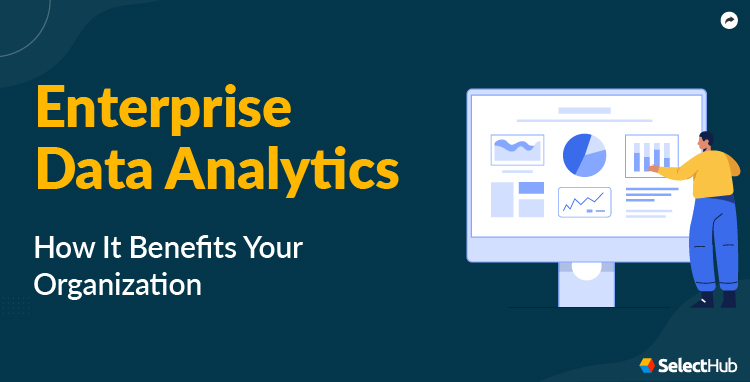Joe owns a chain of gyms across California and needs to reduce customer attrition. He decides to leverage enterprise analytics to identify customers likely to cancel their memberships this year. His analyst gathers and analyzes data using business analytics tools to offer attractive incentives for retaining members. Let’s look at how analytics can benefit your organization.
Compare Top Business Analytics Software Leaders

This Article Covers:
What Is Enterprise Data Analytics?
Enterprise data analytics is the process of accumulating, analyzing and processing huge data sets to derive insights while making smarter business decisions. It employs different techniques, including data mining, predictive analytics, correlations, data discovery, visualization and more.
Enterprise analytics discover potholes in the customer journey, identify emerging trends in the eCommerce industry or optimize supply chain processes to ensure faster deliveries.
Primary Benefits
The massive amount of data enterprises generate contains valuable insights that analytics can harness. Enterprise analytics helps businesses create personalized marketing campaigns for customers and mitigate risks. Let’s look at the benefits of enterprise data analytics in detail:
Offer a Seamless Consumer Experience
Organizations collect consumer data from sources like POS systems, transactional databases, in-store sensors, supply chain software, websites, social media and more. They create comprehensive user profiles from this data to obtain an end-to-end view of consumer behavior, preferences and pain points while providing a seamless experience.
For instance, a retail clothing store with an online presence consolidates and analyzes data from social media pages and curates campaigns to promote products and services to the target audience. Run behavioral analysis models on consumer data to offer product recommendations during checkout to boost sales.
Make Informed Decisions
Leverage enterprise analytics to guide decisions and mitigate losses. It plays a vital role in reducing inefficiencies and optimizing processes. Dashboards and reports identify correlations between data points and offer detailed insights into price segmentation, cost valuation, product innovation, workforce planning and more.
Enterprise data analytics improves the way organizations attract, hire and retain talent. For example, a consulting group decides to recruit for key functional roles. It aspires to hire employees with greater potential to succeed. As a part of the process, the analytics team gauges data points concerning education, demographics, work history, performance and more.
After running the data through multiple regression models, the analyst identifies employees likely to succeed in specific roles.
Compare Top Business Analytics Software Leaders
Streamline Operations
Track supply chain processes to identify bottlenecks and predict future issues. If a demand forecast indicates that a vendor can’t provide raw materials on a specific date to cater to the holiday season, the enterprise can choose to replace them and mitigate production delays.
Moreover, many organizations struggle with inventory levels. Analytics can help determine optimal product levels based on seasonality and ongoing trends.
Gauge Consumer Patterns
Organizations that use consumer behavior insights are more likely to succeed. Robust market segmentation offers useful narratives about consumer buying behavior. Predictive modeling can reduce customer churn and measure marketing campaign performance.
Analyze user metrics in Google Analytics. Source
Similarly, an online retailer can understand its web presence by gauging metrics like new and returning visitors, bounce rate, average session duration, average time on page and more. These KPIs offer crucial insights into content that appeals to different customer segments.
Mitigate Risks
Risks are inevitable and commonly appear with security, fraud, compliance, and operational or financial processes. Data security is paramount to enterprises that deal with large amounts of data. Enterprise data analytics can gauge risks and point out preventative measures. It identifies data breach origins by parsing, processing and visualizing audit logs. This information can locate vulnerabilities and uncover measures to avoid them.
For instance, a retail chain can run a propensity model to predict future outcomes and determine which stores are at risk for theft. This data can highlight security concerns at each store and protect products or personnel.
Industry Use Cases
Let’s look at some industry-specific use cases:
Manufacturing
Enterprise data analytics can predict equipment failure by analyzing structured and multi-structured data, including equipment model numbers, log entries, error messages, sensor data and more. With access to this information, manufacturers can maximize equipment uptime and optimize maintenance.
Retail
Enterprise data can help anticipate consumer demand. Classify key attributes of past and current products while modeling their similarities and the commercial success of your offerings. Build predictive models for new products and services.
Healthcare
Healthcare organizations aim to offer better treatment and improved care. Enterprise analytics improves the patient experience by creating a complete profile with history, diagnosis, treatments and reports. Analytics also identifies diseased genes that cause health issues and recommends personalized treatments.
Telecommunication
Telecom companies need optimal network performance. Enterprise analytics finds areas with excess capacity and reroutes bandwidth as required. It helps plan infrastructure investments and design services that meet customer needs to achieve customer satisfaction while mitigating churn.
Financial Services
Enterprise data analytics helps financial institutions identify new market opportunities, reduce fraud and drive innovation. It classifies, segments and analyzes big data to gauge fraud-indicating patterns.
It empowers organizations to offer new products and services after thoroughly understanding market trends and customer requirements.
Conclusion
Enterprise data analytics can help your business convert complex information into actionable insights and take proactive actions to achieve objectives. This guide serves as helpful resource for understanding the benefits of enterprise data analytics.
How has enterprise analytics helped you achieve your business goals? Let us know in the comments!